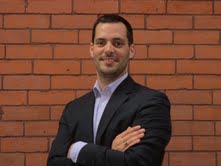Conducted by Philip Girvan, this interview first appeared in the Winter 2016 edition of The Beacon.
The Beacon regularly features interviews with StFX University Alumni on the topic of their relationships with StFXAUT members who challenged, inspired, or helped in some way. This issue’s interview is with Glenn Horne (BBA Honours ‘07, BA Honours ’08).
Glenn Horne: My name is Glenn Horne. I am the Municipal Clerk Treasurer for the County of Antigonish. I’m originally from Canso, Nova Scotia. I first came to X in 2003 and graduated in 2007. Liked it so much I came back and did an additional degree and graduated in 2008.
The first degree I took was in Business Administration with a Honours in Leadership Studies. Second was in Arts with a Honours in Political Science.
The Beacon: At your time at X was there any particular professor, or research librarian maybe, somebody that was helpful or inspirational or mentored you and helped you on your career path?
Glenn Horne: There were a number. I think I’ve taken lessons from a lot of professors that have assisted me in my career and life and in a lot of different ways. In particular, Todd Boyle in the Business Department was my thesis adviser for my business degree, and he also employed me through a summer and part of a year as a research assistant, and so I learned a lot from him. That was my first non-recreation based job, so doing research and that kind of thing was far different than life-guarding and swimming instruction and all that kind of stuff that I was doing before that. He was really helpful in that I found he included me a lot in all kinds of discussions he had with other professors and researchers. He provided a lot of guidance on how to write, how to present, how to research, how to do formal research, and also the topics that he was looking into I found quite interesting as well so that was a really good experience.
Other business professors as well – I can recall Neil Maltby…I had him for Introduction to Business and International Business, I believe the course was called. I found him to be a great teacher, but also he challenged his students quite a lot, which I really enjoyed. You might think something’s going to be a walk in the park, and then you kind of realize that the expectation is a lot higher here than maybe you expected and try to meet that expectation.
The Beacon: Going back to Todd and some of the skills that you learned while you did research for him: have you been able to apply either some of the stuff you studied, some of the skills you learned working with him in your current position, perhaps past positions as well, but particularly here with the Municipality.
Glenn Horne: Definitely the ability to actually do research. I don’t profess to be a researcher in my day job, but, you know, the rigours of researching: I do still employ a lot of those things. Rigorously documenting what you’re looking for where and how you’re looking for it. I find that quite helpful in policy development which is where I apply it most often now. Likewise when I went on after Todd and did my BA and then MA I used a lot of those techniques… mostly in the arts and policy realm, but still the same kind of techniques so that was quite helpful.
The Beacon: In your current position, there’s people that apply for municipal grants all the time.
Glenn Horne: Yep.
The Beacon: And having learned a bit about methods, and the need for rigour, and the need to consider so many different things at once I should think that that is helpful as you evaluate these grants.
Glenn Horne: Absolutely. And likewise with program and policy development, it’s the same kinds of things.
The Beacon: I think that’s pretty good unless there something else you’d like to add?
Glenn Horne: I was going to mention I had the business experience and then I had a really positive arts and political science experience and probably one of…the one thing from my time at StFX that stands out more than anything else were two seminars that I took as part of my Political Science degree: one with Doug Brown and one with Jim Bickerton. They were both around Canadian politics. Jim was my thesis adviser and Doug was the second reader on my thesis. Those seminars were fun. They were challenging. At that time of your educational career, they surround you with your peers who are among the smartest people that you know…All of the honours students in political science: you’re either international or you’re Canadian. And all the honours students have to take certain seminars and two of the seminars I had taken were solely on Canadian politics and the various subjects within Canadian politics. That was the focus of the semester-long seminar.
So rather than your traditional classroom venue, it was literally ten students and the professor sitting around a boardroom table going through discussions and analyzing various scenarios and debating and challenging one another and whatnot, and I found those conversations, like I said, in addition to being fun, very challenging. You had to do your research, come into class and be prepared to defend any position that you’ve taken on anything, and that, in particular, is very much applicable to what I do now. Because I have to be as well-versed as I can be in whatever I’m looking at or about to discuss, or debate or bring to council and also be prepared to back up what I know, and, if it’s a principled discussion, be prepared to defend that perspective. Those were really fun training grounds, and those are experiences and skills that I definitely took on further.

